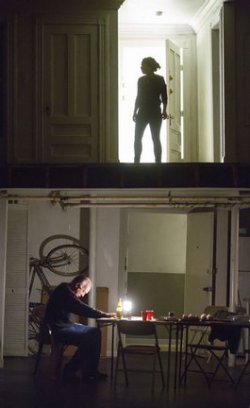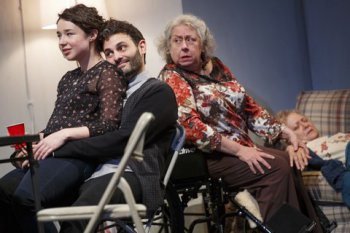The Humans
Riveting, ultimately chilling family drama of how we live now from the talented author of “Speech & Debate” starts slowly but packs a tremendous wallop.

Reed Birney, Jayne Houdyshell, Cassie Beck, Sarah Steele and Arian Moayed in a scene from “The Humans” (Photo credit: Joan Marcus)
[avatar user=”Victor Gluck” size=”96″ align=”left” ] Victor Gluck, Editor-in-Chief[/avatar] For the first half of Stephen Karam’s The Humans, the Blake family Thanksgiving seems to be nothing but a banal seasonal gathering. And then suddenly the author’s message comes into focus and the play becomes a haunting drama and unnerving ghost story which is unlike anything you have seen lately. The superb cast headed by Reed Birney and Jayne Houdyshell under the direction of the always interesting Joe Mantello who has piloted many important new plays turns The Humans into a memorably unique experience. Karam, whose plays include Speech and Debate and Son of the Prophet, has been given a splendid Roundabout Theatre Company production for its third premiere of one of his plays.
The play begins at the new duplex home of Brigid Blake and her boyfriend Richard in Chinatown, an area decimated by Hurricane Sandy. As Brigid points out to her parents Erik and Deirdre who have driven in from Scranton along with Erik’s senile mother called Momo, that is the reason that she has been able to rent so large an apartment in Manhattan. Although it is Thanksgiving, none of the characters appear to have anything to celebrate. Everyone seems to have his or her gripe.
Sister Aimee, a high-powered lawyer from Philadelphia, has developed Ulcerative Colitis just around the time that her long-term girlfriend Carol moved out. Brigid, who has completed her music degree, has just discovered why she is not getting any internships due to the bad reference her favorite professor has given her. Momo has periodic fits and her condition appears to be getting worse since her granddaughters last saw her. Erik is having trouble sleeping and his wife Deirdre’s Weight Watchers regimen does not seem to be working. And why have they not starting building by the lake as expected? Even Richard, Brigit’s significant other is recovering from a many years’ long bout with depression and has been working on starting a new career at age 38.

Reed Birney (below) and Sarah Steele (above) in a scene from “The Humans” (Photo credit: Joan Marcus)
And then it is revealed that Erik and Aimee were in the vicinity of the World Trade Center on 9/11 and Brigid’s Chinatown apartment (on a Zone A flood plain) is only several blocks away, bringing back bad memories. The continuing thumps and crashes from the apartment above are disturbing. When Erik’s real problem is revealed, it is insurmountable. And the lights begin burning out one by one. Even a malevolent Nature seems to be against this family.
The play could be called “The Way We Live Now” and in the future people will come back to it to find out what life was like in this decade. Karam uses as an epigram to the text of the play a quote from Napoleon Hill’s Think and Grow Rich:
“There are six basic fears, with some combination of which every human suffers at one time or another…
The fear of POVERTY,
The fear of CRITICISM,
The fear of ILL HEALTH,
The fear of LOSS OF LOVE OR SOMEONE,
The fear of OLD AGE,
The fear of DEATH.”
Karam has succeeded in writing a very moving and eerie play about one modern American family coping with all of these problems but each in his or her own way. As the noises grow louder and the lights continue to blow out, it is as if modern life is a series of trials and tribulations that we can’t overcome. Not only does the play become more poignant as it nears its conclusion, but the effects of a malevolent Nature will have your hair standing on end. This is what “humans” have to deal with at this point in time, and this powerful play leaves out nothing that is a problem in modern life as we know it.

Sarah Steele, Arian Moayed and Jayne Houdyshell in a scene from “The Humans” (Photo credit: Joan Marcus)
Mantello has obtained such a realistic ensemble performance from his brilliant cast that it is difficult to wrap one’s mind around the fact that these actors on stage are not really a family that has lived among each other for many years. Birney’s Erik makes his disquiet felt in all kinds of physical but silent ways. Houdyshell goes the other route and every word drips with sarcasm or need. Sarah Steele’s Brigid is a bundle of nerves as she takes everything said to heart. Cassie Beck’s Aimee is suffering in silence but her pain is made palpable in her frequent trips to the bathroom. Lauren Klein’s Momo is a perfect depiction of someone going in and out of dementia. And Arian Moayed’s Richard is the outsider having trouble negotiating among this tight family group.
David Zinn’s two-story set is beautifully used by Mantello as the characters drift around the four rooms the way one does at a family gathering. The set becomes almost another character in this story of the fears of modern life. The costumes by Sarah Laux define how we dress today. Justin Townsend makes the lighting design with its sudden descents into darkness into a spine-chilling plot device in what begins to seem like a contemporary ghost story. The scary sounds from the apartment above and the nearby trash compactor are the equally memorable work of Fitz Patton.
In The Humans, playwright Stephen Karam has hit his stride and written a new work that will define our era and the problems the people of our age now suffer from. Under the direction of Joe Mantello, the cast led by veteran actors Reed Birney and Jayne Houdyshell create an ensemble that will make you feel that they are living not acting their roles. And the production team has elevated this dysfunctional family drama into a mythic and archetypal drama of enormous proportions.
The Humans (through January 15, 2015)
Roundabout Theatre Company
Gerald Schoenfeld Theatre, 236 W. 456th Street, in Manhattan
For tickets, call Telecharge at 212-239-6280 or visit http://www.telecharge.com
For tickets, call 212-719-1300 or visit http://www.RoundaboutTheatre.org
Running time: 100 minutes with no intermission






Leave a comment